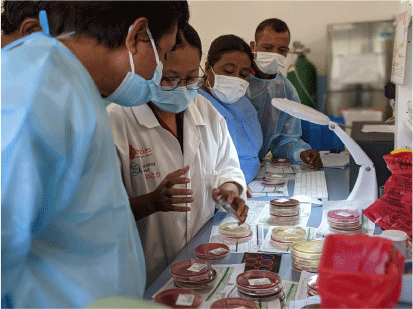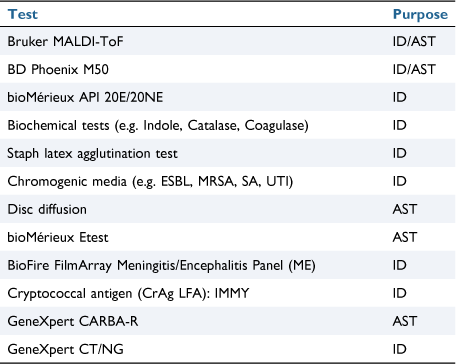Strong relationships between the Northern Territory of Australia and Timor-Leste
Nevio Sarmento A , Tessa Oakley A , Endang Soares da Silva B , Ari Tilman B , Merita Monteiro A B , Lucsendar Alves A , Ismael Barreto A , Ian Marr A , Anthony D. K. Draper A C D , Gloria de Castro Hall E , Jennifer Yan A F and Joshua R. Francis A F *A Global and Tropical Health Division, Menzies School of Health Research, Charles Darwin University, Darwin, NT, Australia.
B Laboratorio Nacional da Saude, Timor-Leste Ministry of Health, Dili, Timor-Leste.
C Centre for Disease Control, Northern Territory Department of Health, Darwin, NT, Australia.
D National Centre for Epidemiology and Population Health, Australian National University, Canberra, ACT, Australia.
E Northern Territory Pathology, Northern Territory Department of Health, Darwin, NT, Australia.
F Department of Paediatrics, Royal Darwin Hospital, Northern Territory Department of Health, Darwin, NT, Australia.

Nevio Sarmento is a microbiologist from Timor-Leste, and PhD scholar at Menzies School of Health Research, Charles Darwin University. He continues to provide leadership to microbiology capacity building and research activities in Timor-Leste. |

Tessa Oakley is a microbiologist, PhD scholar and senior laboratory technical advisor with Menzies School of Health Research. She works alongside Timorese scientists and laboratory technicians to mentor and train in microbiology in the National Health Laboratory and referral laboratory sites in Timor-Leste. |

Endang Soares da Silva is a medical scientist and the Executive Director of the National Health Laboratory in Timor-Leste. |

Dr Ari Tilman is a medical doctor and the Director of Clinical Pathology and Microbiology at the National Health Laboratory in Timor-Leste. |

Dr Merita Monteiro is a medical doctor and the Director of Toxicology at the National Health Laboratory in Timor-Leste. |

Lucsendar Alves is a medical scientist and senior project coordinator working with Menzies School of Health Research. |

Ismael Barreto is a medical scientist and former Executive Director of the National Health Laboratory in Timor-Leste, currently working with Partnership for Human Development. |

Dr Ian Marr is an infectious diseases specialist and microbiology based in Canberra, with an ongoing role in mentoring and advising in areas of infectious diseases and microbiology in Timor-Leste. |

Anthony Draper is a senior epidemiologist and medical scientist, working with the Northern Territory Centre for Disease Control, and leading on mentoring in surveillance and epidemiology across Menzies School of Health Research projects in Timor-Leste. |

Gloria de Castro Hall is a senior microbiologist at Royal Darwin Hospital, who has provided significant mentoring and training in the National Health Laboratory in Timor-Leste. |

Dr Jennifer Yan is a paediatrician and infectious diseases specialist who works at Royal Darwin Hospital and co-leads Menzies School of Health Research projects in Timor-Leste. |

A/Professor Joshua Francis is a paediatrician and infectious diseases specialist who works at Royal Darwin Hospital and co-leads Menzies School of Health Research projects in Timor-Leste. |
Microbiology Australia 43(3) 125-129 https://doi.org/10.1071/MA22039
Submitted: 8 June 2022 Accepted: 1 September 2022 Published: 27 September 2022
© 2022 The Author(s) (or their employer(s)). Published by CSIRO Publishing on behalf of the ASM. This is an open access article distributed under the Creative Commons Attribution-NonCommercial-NoDerivatives 4.0 International License (CC BY-NC-ND)
Abstract
Strong, enduring partnerships exist between the Northern Territory and Timor-Leste, and in recent years collaborations have led to significant developments in health system capacity in Timor-Leste. Laboratory strengthening has been a key focus; improved diagnostic microbiology capability, especially in the National Health Laboratory, is having an impact on individual patient management and outcomes, epidemiological surveillance, and public health responses to communicable disease challenges including antimicrobial resistance.
Keywords: antimicrobial resistance, bacteriology, epidemiology, global health, health system strengthening, microbiology, Northern Australia, surveillance, Timor-Leste.
Introduction
The National Health Laboratory (Laboratório Nacional de Saúde (LNS)) in Timor-Leste provides a routine diagnostic microbiology service, using a combination of traditional bench methods and automated tests for organism identification and antimicrobial susceptibility testing (AST) (Fig. 1). It functions as a reference laboratory in Timor-Leste, while also providing an important clinical diagnostic service, especially for the National Hospital (Hospital Nacional Guido Valadares (HNGV)). Its capacity for diagnostic microbiological testing has increased substantially in recent years, with key partnerships into Northern Australia contributing to important laboratory strengthening initiatives.

|
Background
Timor-Leste is a small half-island nation situated between Indonesia and Australia, about 700 km from Darwin, Australia. Timor-Leste is a relatively new country, having achieved independence for the second time in its history in 2002. The health sector in Timor-Leste is heavily dependent on external funding, and currently has no internationally accredited medical diagnostic laboratories.1 HNGV is the main referral hospital for the country, located in the capital city of Dili, adjacent to LNS. It has a 260-bed capacity and is the main hospital for the five neighbouring districts, accounting for 46% of Timor-Leste’s total population.2 HNGV has a diagnostic laboratory on site which includes haematology, biochemistry, and histopathology, but diagnostic microbiology services are provided by LNS, which is situated just outside its grounds.
The microbiology laboratory at LNS was established in 1980 during the Indonesian occupation and the service was limited to urine and stool microscopy and culture, pus/wound swab culture and tuberculosis (TB) slide microscopy. After the vote for independence in 1999, the microbiology laboratory was re-established with support from laboratory advisors who had previously worked at Royal Darwin Hospital (RDH) Pathology. However, maintaining continuity of service was challenging due to human resource constraints and limited availability of reagents and consumables, contributing to a lack of trust and use from clinicians at HNGV. Prior to 2015, the laboratory was primarily conducting research or program-based work, with minimal attention on expanding the range of tests available for clinical diagnostic samples, re-organisation of microbiology workflow, strengthening quality assurance or generation of antimicrobial resistance data.
In 2016, an initial working relationship between the Microbiology Department at LNS, the Menzies School of Health Research (Menzies) and the RDH microbiology service was initiated. This collaboration led to an increase in capacity of the diagnostic microbiology service, improvement of laboratory infrastructure and ongoing training of laboratory personnel. In this paper we highlight capacity building, research, and diagnostic microbiology aspects of the partnerships between LNS, Menzies, and the RDH laboratory.
Capacity building links
As part of the initial working relationship with Microbiology Laboratory at LNS, Menzies applied for and implemented small grant projects with a broad aim to increase diagnostic capacity (Fig. 2). In 2016, Menzies initially implemented a study titled ‘Resistance in Urine and Skin isolates in Timor-Leste (RUSTLE)’ – an analysis of bacterial isolates from urine and skin swabs and their antimicrobial resistance profile, with support from RDH for confirmation of organism identification and automated AST results.3 The RUSTLE study marked the beginning of the long-term support between the Darwin and Dili institutions. Following RUSTLE, Menzies implemented a pilot study working on drug susceptibility and genotyping of Mycobacterium tuberculosis (MTB), assisting the National TB Program (NTP) to understand the burden of TB resistance and origin of MTB isolated in Timor-Leste.

|
Having experienced the limitations of the current diagnostic bacteriology service and identifying a need to support clinicians and surveillance, Menzies, with the support of the Australian Department of Foreign Affairs and Trade (DFAT), commenced a project titled ‘Surveillance, Training, Research Opportunities and National Guidelines for Communicable Disease Control in Timor-Leste’ (STRONG TL). The STRONG TL project was designed to support capacity-building across three key components of the health system, integral to responding to infectious diseases challenges: Clinical, Laboratory, and Surveillance.4 The project included deployment of microbiology scientists from RDH Pathology in Darwin to mentor Timorese scientists at LNS, linked to similar activities in the surveillance department and in clinical settings including at HNGV, focused on improving awareness of the importance of laboratory diagnostics, infectious disease surveillance and antimicrobial stewardship. A key component of the STRONG TL project has been side-by-side mentoring by scientists and epidemiologists from Northern Australia who have provided guidance, support and encouragement to Timorese colleagues who observe similar communicable disease threats and encounter similar challenges of remoteness. This mentoring also extends back to the Australian staff who have developed their skills in working in cross-cultural and challenging environments. Three scientists travelled to Timor-Leste on a rotating basis between 2018 and 2019, for up to 2-month stints at a time. The STRONG TL project has supported development of empirical antibiotic guidelines and Integrated Disease Surveillance and Response (IDSR) guidelines, which have built a strong foundation for future capacity-building programs.5
In 2019, Menzies was awarded the Fleming Fund Country Grant to Timor-Leste, which has funded significant investment in capacity for antimicrobial resistance and antimicrobial use surveillance in human health and animal health in Timor-Leste. The Fleming Fund Country Grant has facilitated significant expansion and refurbishment of the LNS microbiology laboratory, as well as installation and use of advanced diagnostic microbiology equipment for automated organism identification and AST. A combination of side-by-side mentoring and remote training and support for LNS microbiology staff has resulted in a 7-day per week diagnostic microbiology service generating quality-assured microbiological results daily and high-quality antimicrobial resistance surveillance data. Now, up to 500 blood culture specimens are processed per month in the LNS microbiology laboratory (Table 1).

|
The coronavirus disease 2019 (COVID-19) pandemic signalled a need for rapid capacity-building in molecular diagnostics in Timor-Leste. With financial support from DFAT, Menzies assisted in the refurbishment of the molecular department at LNS and provided in-country technical support and training for scientists in diagnostic testing for severe acute respiratory syndrome coronavirus 2 (SARS-CoV-2). Confirmatory testing was conducted for the first 500 samples in the RDH laboratory, helping LNS to verify its assay and learn from the experience of RDH in establishing a new assay. Since then, Timor-Leste has experienced three distinct waves of community transmission of SARS-CoV-2 infection, and Menzies has supported the laboratory over times of high testing requirements, with capacity increased such that up to 1500 samples per day could be processed.
The capacity-building programs of STRONG TL and the Fleming Fund Country Grant provided the foundation for a strong laboratory response to COVID-19 in Timor-Leste, as part of ongoing effective collaboration between Menzies and the Ministry of Health across clinical, surveillance and laboratory areas.
Research links
The Northern Territory and Timor-Leste have collaborated on significant research projects, that have been deliberately linked to health system strengthening initiatives aimed at building capacity for diagnostic laboratory testing in Timor-Leste. Results from the RUSTLE study conducted in 2016 provided preliminary data on antimicrobial resistance in Timor-Leste. Over 200 isolates from urine and skin samples from inpatients at HNGV were cultured onto agar slopes and transported to the Microbiology Department at the Royal Darwin Hospital for bacterial identification and antimicrobial susceptibility testing. This study demonstrated high rates of bacterial resistance at HNGV, most notably a ceftriaxone resistance rate in species in the order: Enterobacterales of 35%.3
In 2018, the National Critical Care and Trauma Response (NCCTRC), based at RDH in Darwin, supported a Menzies, RDH and LNS collaboration that involved a trial of a deployable mobile laboratory for rapid diagnostic testing, using the multiplex RT-PCR BioFire® FilmArray® platform.6 Through this research project, a blood culture service was established and LNS, and PCR screening of CSF and GI samples was introduced. Confirmation with concurrent standard culture methods allowed for rapid upskilling of scientists and verification of multiplex PCR results. One hundred and seventeen pathogens were identified including 25 organisms in blood culture and four separate CSF pathogens.6
There are ongoing research projects investigating the epidemiology of childhood meningitis, encephalitis, malnutrition, and pneumonia, with investigator teams including paediatric and infectious diseases clinician-researchers working across the Timor-Leste Ministry of Health, Menzies and the RDH contributing to provision of technical advice. The child mortality rate is high in Timor-Leste, and leading causes include malnutrition and pneumonia. Pulmaun Saudavel (PULSA, ‘healthy lungs’) study is a prospective cross-sectional surveillance study that aims to assess the prevalence of S. pneumoniae nasopharyngeal carriage in children aged 1–59 months admitted to HNGV with pneumonia and/or malnutrition between September 2019 and August 2020. The study, a collaboration between Menzies and Timorese researchers from LNS and HNGV, has provided preliminary data that has been used to inform Ministry of Health decisions regarding introduction of a pneumococcal conjugate vaccine in Timor-Leste. The Encephalitis and Meningitis Aetiology (EMA) study has identified cases of Japanese Encephalitis, and other causes of childhood meningoencephalitis. Data analysis and reporting is ongoing for these studies, but the public health impact is already apparent.
Menzies, LNS and researchers from the Ministry of Health, have collaborated with the Australian National Centre for Immunisation Research and Surveillance (NCIRS) to carry out seroprevalence studies involving healthcare workers,7 residual serum samples from hospital laboratories, and a nationwide population-representative cohort of more than 5000 people. The research is aimed at improving understanding of the epidemiology and vaccine coverage for key vaccine-preventable diseases, including measles, rubella, COVID-19, dengue and hepatitis B. This research has enabled significant investment in serological testing capacity at LNS, and preliminary results are being used by the Ministry of Health to inform decision-making regarding vaccine policy and practice.
Menzies has also partnered with the Ministry of Health to deliver Structured Operational Research and Training IniTiative (SORT IT) training in Timor-Leste. Timorese participants in SORT IT training conduct a research project and learn research skills simultaneously. Practical skills learned in the program include development of study protocols, collection of high-quality data, publication in peer-reviewed journals and use of research in evidence-informed decision-making by public health authorities.
Microbiological links
As laboratory capacity has grown in Timor-Leste, improved understanding of the epidemiology and distribution of antimicrobial resistance provides important regional context and interesting comparisons with antimicrobial resistance rates in Northern Australia. Menzies has worked with LNS to generate antibiograms for clinically significant isolates from HNGV and surrounding Dili, modelled on the antibiogram used at RDH. Consistent with the findings of the RUSTLE study,3 recent Timor-Leste antibiograms demonstrate high rates of Gram-negative resistance, especially Extended-Spectrum Beta-lactamase (ESBL) producing organisms. In 2021, 77% of Klebsiella pneumoniae clinical isolates tested at LNS were phenotypic ESBL-producers. This is significantly higher than reported in the Northern Territory, where 5% phenotypic ESBL resistance was seen in K. pneumoniae in 2019.8 Only 11% of Staphylococcus aureus isolates in the RUSTLE study were MRSA, however, analysis of recent clinical isolates from HNGV show much higher rates of MRSA (32% of 171 S. aureus isolates in 2020), comparable with MRSA rates reported in the Northern Territory (34% in 2020).9
In 2022, the LNS in Dili was able to culture and identify the first isolate of Burkholderia pseudomallei in Timor-Leste. A previous study on seroprevalence of B. pseudomallei antibodies was conducted on Timorese refugees evacuated to Darwin after the referendum for independence in 1999.10 Leveraging extensive experience in the diagnosis and management of melioidosis,11 the microbiology laboratory at RDH and the Melioidosis research group at Menzies have supported LNS by providing remote training as well as confirmatory PCR and AST testing of B. pseudomallei for Timor-Leste. Genomic sequencing is ongoing and will be informative in identifying possible epidemiological links between the two countries.
Conclusion
The close relationship between LNS, Menzies, and the RDH Microbiology Laboratory has enabled ongoing strengthening in diagnostic bacteriology and antimicrobial surveillance in Timor-Leste. Important work is continuing to establish greater capacity in municipalities outside of Dili, led by LNS but with ongoing support and collaboration from partners in Northern Australia.
Data availability
Data sharing is not applicable as no new data were generated or analysed during this study.
Conflicts of interest
The authors declare no conflicts of interest.
Declaration of funding
This work was made possible through the support of the Fleming Fund, and the Australian Government. The Fleming Fund is a UK aid investment programme to tackle antimicrobial resistance in low- and middle-income countries around the world and is managed by the UK Department of Health and Social Care. The Australian Government, through the Indo-Pacific Centre for Health Security, has supported laboratory strengthening projects in Timor-Leste, and partnerships with Australian institutions including Menzies School of Health Research and the Northern Territory Department of Health.
References
[1] Guinness, L et al.. (2018) Determinants of health care utilisation: the case of Timor-Leste. Int Health 10, 412–420.| Determinants of health care utilisation: the case of Timor-Leste.Crossref | GoogleScholarGoogle Scholar |
[2] Jayaratnam, S et al.. (2019) Maternal mortality and ‘near miss’ morbidity at a tertiary hospital in Timor-Leste. Aust NZ J Obstet Gynaecol 59, 567–572.
| Maternal mortality and ‘near miss’ morbidity at a tertiary hospital in Timor-Leste.Crossref | GoogleScholarGoogle Scholar |
[3] Marr, I et al.. (2018) Antimicrobial resistance in urine and skin isolates in Timor-Leste. J Glob Antimicrob Resist 13, 135–138.
| Antimicrobial resistance in urine and skin isolates in Timor-Leste.Crossref | GoogleScholarGoogle Scholar |
[4] Draper, ADK et al.. (2019) Developing integrated disease surveillance and response in Timor-Leste. NT Dis Control Bull 26, 20–23.
[5] Francis, JR et al.. (2018) Antimicrobial resistance and antibiotic use in Timor-Leste: building surveillance capacity with a One Health approach. Commun Dis Intell 44, 1–3.
| Antimicrobial resistance and antibiotic use in Timor-Leste: building surveillance capacity with a One Health approach.Crossref | GoogleScholarGoogle Scholar |
[6] Marr, I et al.. (2021) Development of a mobile laboratory for sudden onset disasters. Disaster Med Public Health Prep 15, 170–180.
| Development of a mobile laboratory for sudden onset disasters.Crossref | GoogleScholarGoogle Scholar |
[7] Arkell, P et al.. (2022) Serological surveillance of healthcare workers to evaluate natural infection- and vaccine-derived immunity to SARS-CoV-2 during an outbreak in Dili, Timor-Leste. Int J Infect Dis 119, 80–86.
| Serological surveillance of healthcare workers to evaluate natural infection- and vaccine-derived immunity to SARS-CoV-2 during an outbreak in Dili, Timor-Leste.Crossref | GoogleScholarGoogle Scholar |
[8] Cuningham, W et al.. (2021) Antibiotic resistance in uropathogens across northern Australia 2007–20 and impact on treatment guidelines. JAC Antimicrob Resist 3, dlab127.
| Antibiotic resistance in uropathogens across northern Australia 2007–20 and impact on treatment guidelines.Crossref | GoogleScholarGoogle Scholar |
[9] Wozniak, TM et al.. (2020) Geospatial epidemiology of Staphylococcus aureus in a tropical setting: an enabling digital surveillance platform. Sci Rep 10, 13169.
| Geospatial epidemiology of Staphylococcus aureus in a tropical setting: an enabling digital surveillance platform.Crossref | GoogleScholarGoogle Scholar |
[10] Armstrong, PK et al.. (2005) Seroprevalence of Burkholderia pseudomallei in East Timorese refugees: implications for healthcare in East Timor. Southeast Asian J Trop Med Public Health 36, 1496–1502.
[11] Currie, BJ et al.. (2021) The Darwin Prospective Melioidosis Study: a 30-year prospective, observational investigation. Lancet Infect Dis 21, 1737–1746.
| The Darwin Prospective Melioidosis Study: a 30-year prospective, observational investigation.Crossref | GoogleScholarGoogle Scholar |


